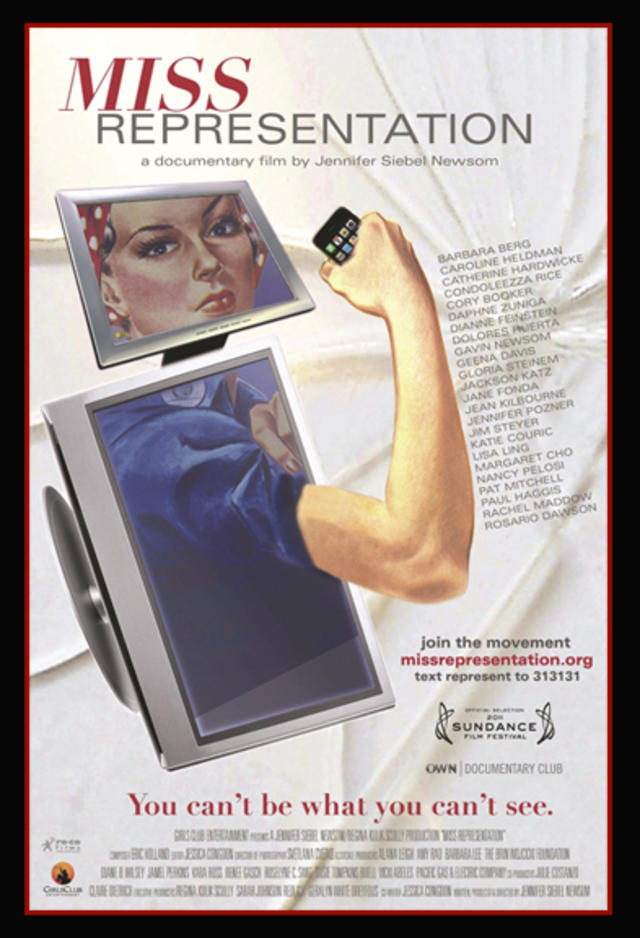Media Lies: A Review of Miss Representation

Miss Representation is the most provocative and inspiring movie I’ve ever seen. This documentary film directed, written, and produced by Jennifer Siebel Newson, explores how media misrepresents and degrades women.

Short clips from movies and from advertisements are spliced into interviews and slides of fascinating statistics, creating a riveting film. The movie features both male and female scholars; interviews of famous women such as Condoleezza Rice, Nancy Pelosi, Rachel Maddow and Gloria Steinem; alongside the heart-wrenching stories of high school students today. I already knew that the media was sexist, but I never peeled back the layers to see how atrocious it truly is and the impact it has on American society.
This documentary made me think about how few powerful women you actually see in the media. In movies, advertisements, and music, women are constantly seen as nothing more than shallow, sexualized objects. The very few female protagonists in television and in films are usually not even strong characters. Their stories revolve around men in what marketers describe as “chick flicks,” and even in action movies, the scantily-clad female superheroes are also obviously targeted to the male audience. In the news, when Katie Couric was the first woman to be a solo anchor for one of the three traditional American broadcast networks, instead of listening to what she had to say, the media scrutinized how she looked and the length of her skirt. Miss Representation shows how this objectification of women not only undermines them, but also leads to the underrepresentation of females in positions of power and influence. It teaches young girls that they should be valued on merely their appearance, discouraging them from pursuing their dreams.

Watching Miss Representation motivated me to change how society treats women and girls. Kids of all ages have the potential to change America and to achieve gender equality by challenging the media and not valuing women just for their appearance. Condoleezza Rice said that we make a mistake when we say that we need a role model to make a difference. Rice exclaimed, “If Sally Ride, the first female astronaut, had been waiting for a female astronaut role model, she would have never done it!”
I have to say, although the points made by the scholars and famous women in the movie were thought-provoking, the stories of the regular high school students were what touched me the most. One girl spoke of how insecure she had always been about her weight, because she had grown to believe that she had to be skinny to be beautiful; and another girl said she would change her appearance just in order to fit in. A high school student spoke of her younger sister who was driven to self-harm because she was teased at school for not having “the perfect body.” These real-life stories showed just how much the media is impacting girls in terrible ways and undermining their self-confidence.
I believe that all teenagers should watch this movie, both boys and girls. It was encouraging to see the women in the film mentoring and reaching out to one another because the only way women will be able to achieve parity with men is by working together. However, I also believe it is important for boys to watch this movie so that they realize sexism is not just a “woman’s issue.” The documentary touched on how men are expected to be smarter, stronger, and superior to women. If men are taught from a young age to have a so-called “tough” and misogynistic attitude and behavior through media’s stereotypes, then this sexism will never go away. Although the media has a terrible impact on society, we as the younger generation have the power to make a difference.
This documentary does have graphic images, so I wouldn’t recommend it for anyone under the the age of 13. I also noted that one or two shocking statistics (such as American teenagers averaging 10 hours and 45 minutes of media consumption per day) seemed borderline unrealistic, so I would be interested to know their sources. Despite the lack of references, it was a wonderfully made, gripping documentary that is definitely worth watching. Not only did the film hold my attention, but it taught me a new way to see media. The featured scholars had interesting points that I had never thought of before, while the stories of high school students today touched my heart. It was also encouraging to see celebrities standing up for feminism and speaking their mind, especially because it was against the media that had made them famous. Miss Representation inspired me to reach out to other girls and to take a stand against social media, and I believe it can inspire you as well.

Gemma Laurence is an outspoken and outdoorsy 16-year-old girl from Maine. She loves writing, running, and playing guitar.
